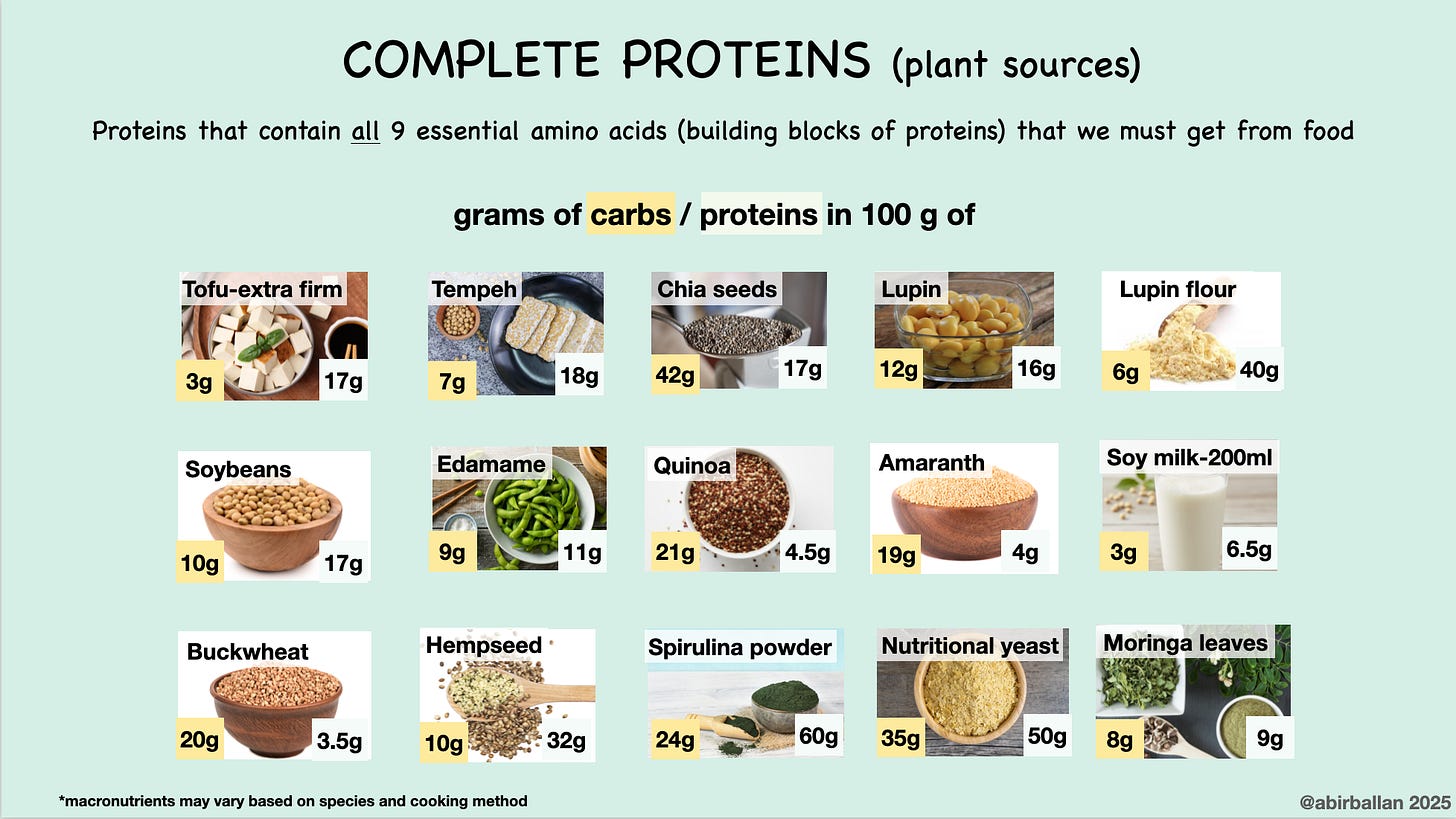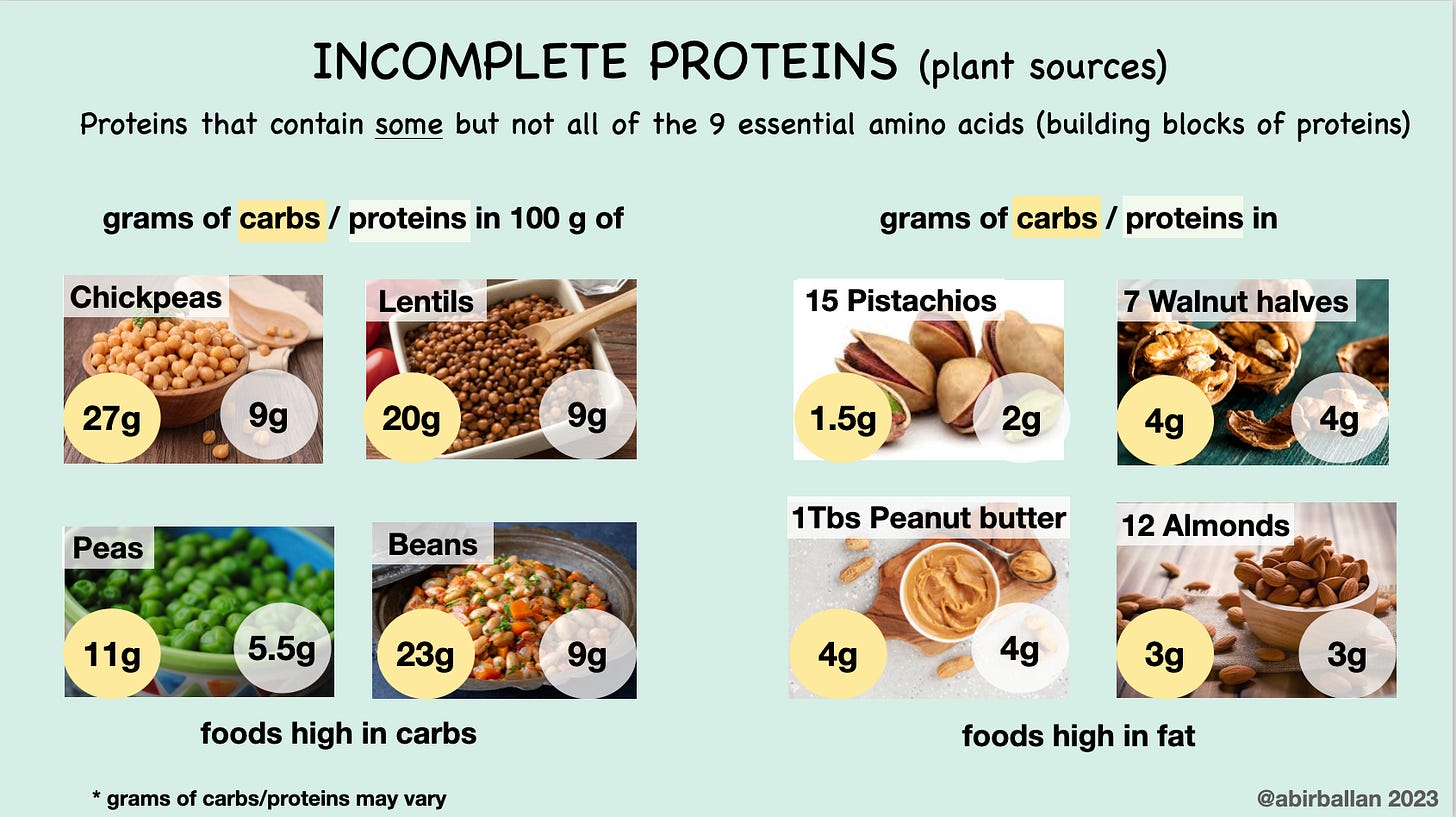PROTEINS
Why are they important and how much do you need?
WHAT ARE PROTEINS?
Proteins are essential macronutrients that consist of chains of amino acids.
Proteins perform different functions in the body based on their shape.
There are nine essential amino acids that the human body cannot make and must be taken from food.
There are eleven non-essential amino acids that the human body can manufacture.
WHAT ARE COMPLETE PROTEINS?
All plant sources of complete protein come with a hefty price tag of carbohydrates. The best options from the above are extra firm tofu, soy milk and lupin flour.
WHAT ARE INCOMPLETE PROTEINS?
Disadvantages of depending on plant sources for your proteins
Legumes, seeds and nuts contain little protein compared to animal sources which means you have to eat more of these sources to cover your daily requirement of protein, consequently increasing your carb and fat intake beyond your caloric needs. This will likely increase your weight. It may also be very tricky to get all your essential amino acids from these sources.
HOW TO DETERMINE YOUR PROTEIN REQUIREMENT?
First calculate your ideal body weight.
For each 1 Kg of ideal body weight, you need about 1.2-2 g of protein/day.
For example, (regardless of your current body weight), if your ideal body weight is 50 kg, you need at least 60g of proteins per day.
If you are active and do weightlifting, you will need more protein (1.4-2g of protein/kg of ideal body weight/day).
Remember this is just an estimate. You need to figure out the right amount for yourself by testing it and observing the impact on your body. Make the scale your best friend and weigh yourself every morning when you wake up.
=> LISTEN TO YOUR BODY
If you are on a high carb diet then you really cannot trust your body’s cues because insulin secretion following each carb meal will pull out the sugar from your blood and into your cells and make you feel hungry soon after even if you’ve had enough calories. This will increase cravings and eating.
If you are on a low carb diet/animal protein/good fats then your body’s cues are much more reliable. Eat mindfully, chew slowly (avoid being on your phone or watching a video while eating) and listen to your body’s cues to detect satiation. You can also track your weight with a given amount of protein/fat intake.
=> If your weight increases, it means you are eating too much protein (or too much fats) (all excess protein beyond your energy requirement is transformed into glucose and then stored as fat if it is not used)
=>If you are losing weight then you may not be getting enough proteins (or not enough good fats).
TOO LITTLE, TOO MUCH
Eating too little proteins from animal sources or eating too much of them are both problematic situations. (These are common problems with vegetarian and keto diets)
Eating too little proteins will prevent your body from functioning properly. It will impair growth, repair, your immune system and all body processes that rely on enzymes, hormones and neurotransmitters (brain chemicals).
Eating too much protein may increase uric acid in the blood. (Uric acid results from the breakdown of proteins). Excess uric acid can lead to joint pain and arthritis as well as kidney stones.
Eating just right is key.
QUICK TIP
For one week, weigh your proteins on a scale to get an idea of the size of the portions.
Sample day:
For a person trying to get 50g of protein/day, they can have:
2 eggs (12g of proteins)
200 ml of milk (7g of proteins)
100g of salmon (20g of proteins)
50g of cheese - 2 slices- (12g of proteins)
LIFESTYLE TIPS
Get your daily protein requirements from animal sources
Eat as much non-starchy vegetables as you want
Consider legumes, starchy vegetables and fruits as carbs (eat them in moderation or limit them if you are trying to lose weight or control diabetes)
Consider seeds and nuts as fats (eat them in moderation as sources of energy to cover your daily energy requirements)
Drink lots of water and herbal teas throughout the day. Sometimes our body confuses thirst with hunger.
Remember this plate from the Switch Challenge?
BONUS GIFT: MY CHOCO-LOCO RECIPE
1 Tbsp of any seed grounded (flaxseeds, sunflower seeds, pumpkin seeds …)
1 Tbsp of any nut butters (Almond, peanut, hazelnut…)
1 tsp of plain organic cocoa powder
A tiny drizzle of honey
Mix them together into a paste and add raspberries, blueberries, blackberries or strawberries
Bon appétit!
Try other sweet things in life, like spending time with loved ones, being out in nature, following your passions….
Disclaimer: All information provided by Abir Ballan is solely intended for educational purposes and is not a substitute for expert advice, diagnosis, or treatment regarding medical or mental health conditions. Always consult your physician before making any decisions related to your physical or mental health.
About the author
Abir Ballan is a Health Coach and a certified NLP and Time Line Therapy Practitioner. She has a Masters in Public Health, a Graduate Degree in Special Needs Education and a BA in Psychology. She is a children’s author with 27 published books.







I would hope that 17 years after the publication of The China Study, which by now is available in 50 languages (or so), the protein myth would have been dismantled, but change takes a generation (or two).
The myth of protein resulted purely from the historical accident that it was the first macronutrient to be identified, and the world has maintained a fixation on protein ever since. T. Colin Campbell's research however has stood the test of time, and his nutrition course is now the most popular online course at Cornell. (see: https://nutritionstudies.org/mystique-of-protein-implications/)
Moreover, we nowt have cardiometabolic testing technology that can sort out the diet mess once and for all, as we can detect immediately and with near certainty the effects of any lifestyle changes a person might try. The food industry has done well for itself by fueling the mythology of various diets, But the facts will eventually win the day. https://www.americaoutloud.news/the-power-of-whole-foods-against-cardiovascular-disease/